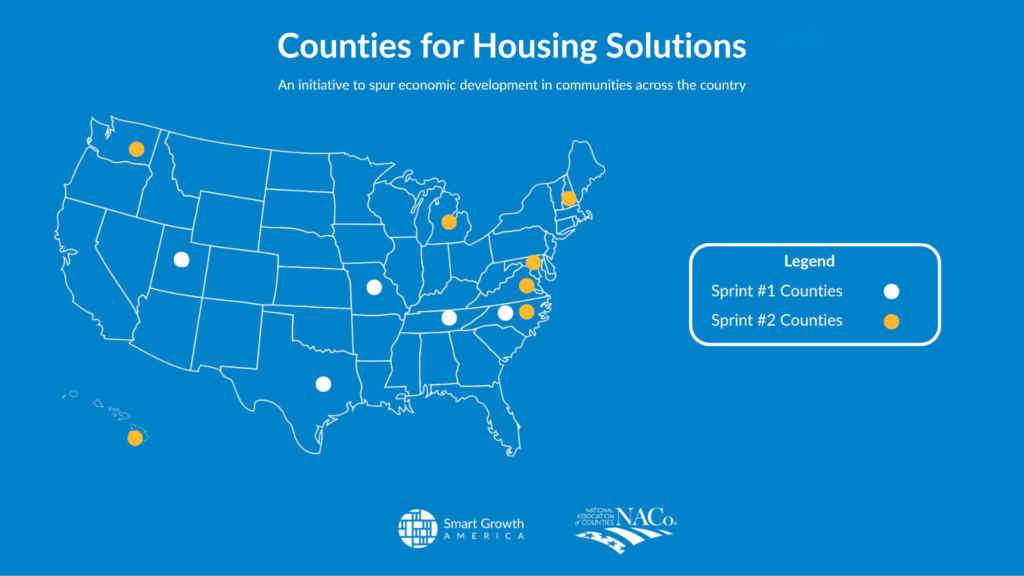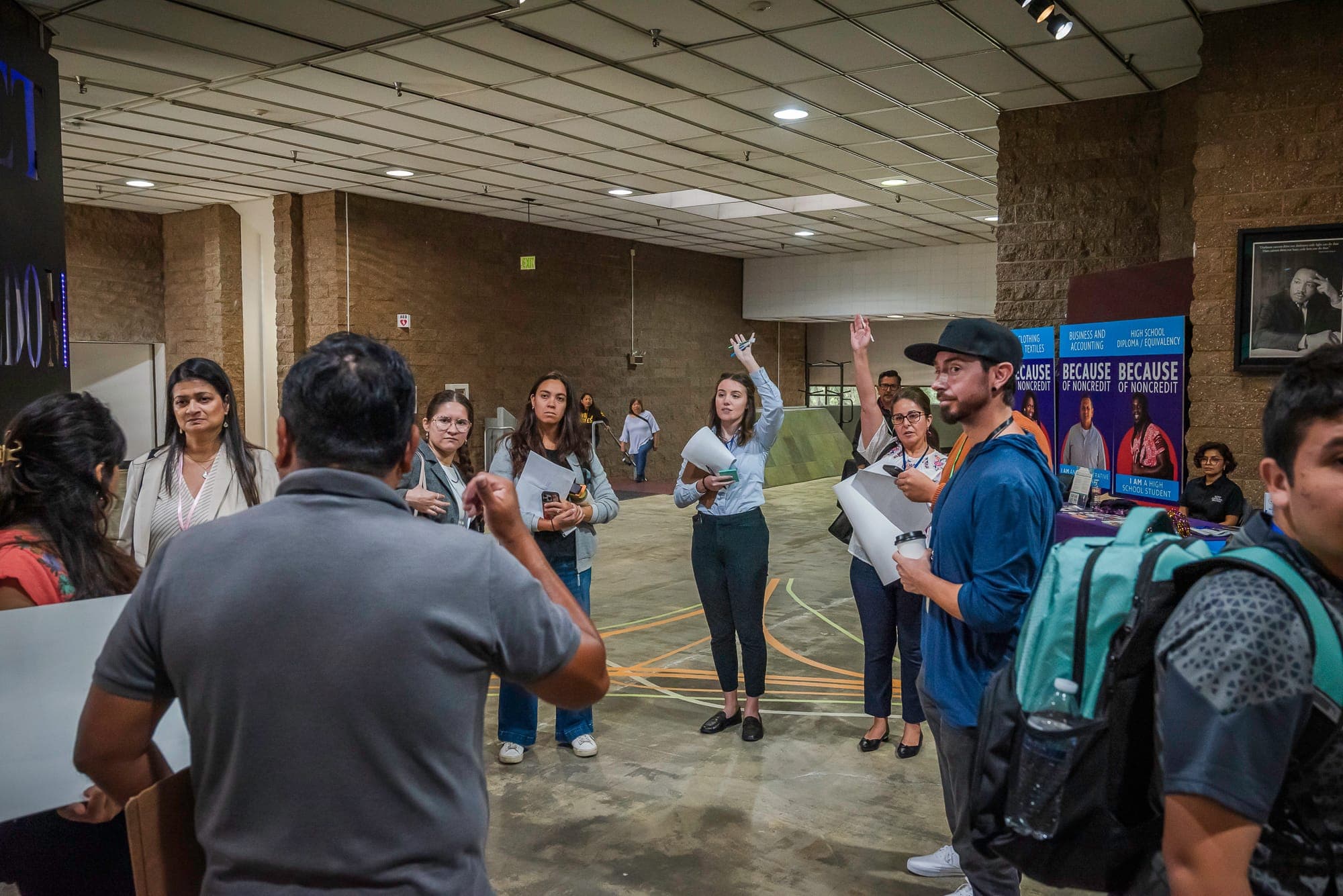
News
By Toccarra Nicole Thomas, Kate Southerland, July 16, 2025
With generous support from the Gates Foundation, Smart Growth America (SGA) and the National Association of Counties (NACo) launched and completed the second cohort of the Counties for Housing Solutions (C4HS) initiative, continuing our commitment to helping counties spur economic development through actionable, locally-driven housing strategies.
Over the course of 13 weeks, a cohort of elected officials, planners, and stakeholders from eight counties—Baltimore City/County, MD, and Grafton County. NH, Cheshire County, NH, Chesterfield County, NH, Sullivan County, VA, Genesee County, MI, Honolulu City/County, HI, Mecklenburg County, NC, and Pierce County, WA—collaborated to create implementable affordable housing development plans in their communities.

Housing affordability is an issue that is top of mind for most Americans. In recent months, solutions that can lower housing costs and increase the supply of permanently affordable housing stock have received bipartisan support. As local governments look to drive economic mobility in their communities, housing production offers a means to make progress for residents and local fiscal objectives. Housing construction has a positive ripple effect in communities—it creates new employment opportunities, provides new tax revenue for local governments, and increases consumer spending in local businesses.
Through a mix of expert-led sessions, peer exchange, and hands-on technical support in both pre-development and development stages, cohort members explored how to repurpose vacant or underutilized county-owned land to meet urgent housing needs while also unlocking economic development wins.
Sprint #2 provided a blend of educational sessions, one-on-one office hours, and collaborative peer learning opportunities. To walk teams through the housing development process, the program touched upon the following topics:
- Finding your land: Selecting the perfect site for housing development.
- Development barriers: Determining if zoning is preventing your community from developing housing and how to eliminate zoning barriers.
- Building support: Understanding the importance of creating a community engagement strategy to overcome potential opposition to sorely needed housing for all.
- Funding and resources: Paying for affordable housing projects without mortgaging the future of their community.
- Finding the right partners: Finding and selecting the right developer for the right housing project on county-owned land.
- Measuring results: Evaluating project results to ensure success.
- Make a lasting impact: Scaling and leveraging a development project to gain a return on investment.
With support from subject matter experts and cross-collaboration opportunities, the cohort developed a variety of mixed-use developments and housing typologies while also addressing significant social and economic barriers presented in their respective county (aging in place, affordability, and vacancy, to name a few). Additionally, all teams focused on developing affordable housing on county-owned land, leveraging cost savings from land acquisition to enhance unit affordability. Each project also emphasized the importance of integrating community into the development process—honoring local history and identity—while positioning housing as a catalyst for broader economic development. At the conclusion of the program, each county emerged with a tailored, ready-to-implement affordable housing strategy designed to reflect their community’s unique needs and opportunities. Below is a recap of each county’s initiative:
- Baltimore City/County, MD: This team identified a site in a food and health desert located 5 miles from Johns Hopkins University. They proposed a redevelopment of the site into a mixed-income, mixed-use project focused on luxury, affordable, and market-rate housing with retail and community amenities on the ground floor. Units will be available at the 30-80 percent AMI income ranges.
- New Hampshire Coalition of Counties: A group of three neighboring counties facing similar challenges joined forces as a coalition to participate in the cohort together. Their goal was to leverage shared experiences to support one another in actively advancing affordable housing across the region.
- Grafton County: Drafted a plan to develop tiny houses across 10 acres, with a focus on workforce housing as a recruitment tool.
- Sullivan County: Drafted a plan to develop a mix of tiny houses and single-family homes across five acres.
- Chesterfield County, VA: Their project centered on rezoning a parcel of land to enable both affordability and the development of desired housing types (multifamily, affordable, and diverse housing typologies). The plan includes constructing 25–30 single-family detached homes arranged around a central multifamily building. Several of the single-family homes are designated as LIHTC-funded units specifically for seniors.
- Genesee County, MI: This team focused on deploying 56 single-family units on a 16-acre site.
- Honolulu County, HI: This team developed a plan to develop three residential high-rise towers with up to 522 units on a parcel located downtown in a transit-oriented development district
- Mecklenburg County, NC: This project was about repurposing a historic school property into a mixed-income project of up to 80 Affordable townhome units at 60-80 percent AMI while honoring the historic nature of the project. There is potential to include senior condos and community amenities such as a community center as part of the project.
- Pierce County, WA: This team drafted a plan to develop up to 28 affordable homeownership units on a four-acre site.
If fully realized, these projects will result in the development of hundreds of housing units—spanning a range of income levels and housing types—successfully deployed across the country with support from the program.
Related News

© 2026 Smart Growth America. All rights reserved
Site By3Lane Marketing












